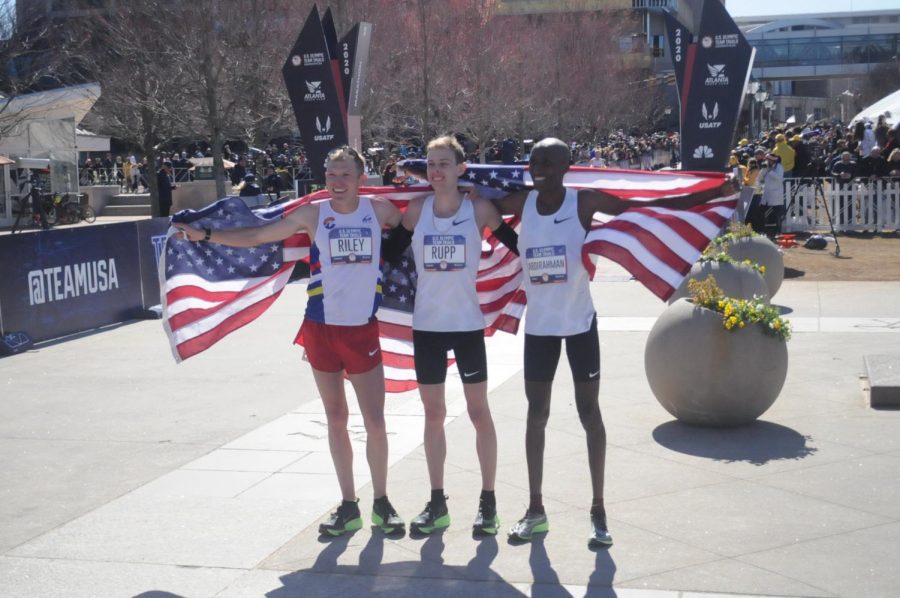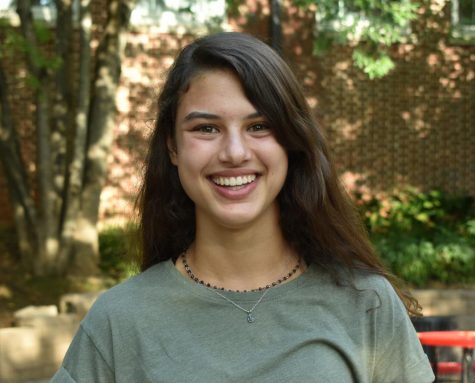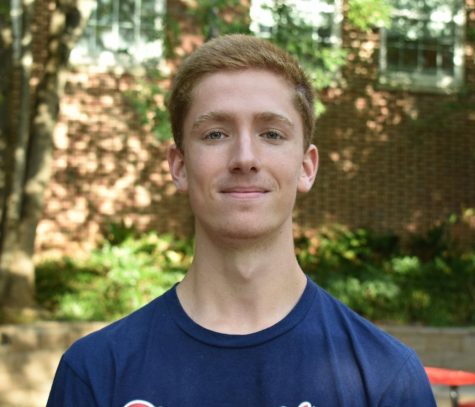U.S. Olympic Team Trials – Marathon conclude with unlikely qualifiers
Left to Right: Jacob Riley, Galen Rupp, and Abdi Abdirahman stand with the American flag in celebration of making the U.S. Olympic Marathon team for the 2020 Tokyo Summer Olympics. Rupp finised first followed by Riley in second and Abdirahman in third.
March 2, 2020
Atlanta is known as “Running City USA,” and for having a large, dedicated running community that takes to the Peachtree Street, Piedmont Avenue and surrounding streets to run every day. When the Olympic Team Trials – Marathon took place Feb. 29, the city turned out in droves to support the record 771 (251 men and 510 women) Olympic hopefuls and to witness six eventual future Olympians take to the hilly streets of Atlanta.
“They (Atlanta) did an amazing job,” third-place finisher and U.S. Olympic Team qualifier Sally Kipyego said. “The crowd was incredible all through, and it’s easy to get carried away with that kind of crowd, and on that last bit (of the course), that crowd just pushed me.”
The course itself, however, was characteristically hilly and challenging, says Kipyego.
“This (course) is hard because you don’t get an over straight hill or a straight downhill,” Kipyego said. “It’s just kind of angulating, and that is difficult because you’re breaking and changing gears; so, it kind of beats your legs in a different way … So, your stabilizers are definitely at work. For this one (Atlanta), it was just really little dips and ups and downs so … you don’t get into a rhythm.”
Despite its difficulty, women’s Trials winner Aliphine Tuliamuk, who also won the AJC Peachtree Road Race in 2017, said she knew what to expect and trained for the hills.
“I think that we really prepared fully well for the hills, and I’ve always believed in myself that I am very good when it comes to running up hills, and today, like every time we went up the hills I felt like I had a lot of energy, and I wasn’t tired, and I was knowing Atlanta was hilly,” Tuliamuk said. “Coach gave us a lot of workouts we went up and down in; so, I was pretty confident. But you can never be too sure.”
The top three in each race will head to Tokyo in July 2020 for the Summer Olympic games. The women’s race ended with Tuliamuk in first with a time of 2:27:23, marathon newcomer Molly Seidel in second at 2:27:31, and Kipyego in third at 2:28:52. None of the top three were in the top five fastest seed times going into the race.
At mile 20, the trio of future Olympians made their move, with Tuliamuk and Seidel side by side and Kipyego about 20 seconds behind.
“Once we broke away, I was like, ‘I can’t believe this is happening,’ so I was like, ‘Molly, let’s go,’” Tuliamuk said. “And there was a time, it was two of us and Sally was not too far, I’m like, ‘Molly, if we’re going to do this, we’re going to do this together.’”
In the men’s race, Galen Rupp made history as he won his second U.S. marathon trials in a row in an unphased 2:09:20, 18 seconds off the men’s Trials record. Rupp made his surge around mile 16, where he left his pack of Atlanta Track Club runner Matthew McDonald and Army runner Leonard Korir. The highly contested second and third spots on the men’s Olympic Marathon team were filled by Jacob Riley in 2:10:03 and Abdi Abdirahman in 2:10:04, who were mere meters in front of fourth-place finisher Korir.
Abdirahman made history as the oldest man to qualify for the U.S. Olympic team in the marathon at 43 years old. It is also his fifth Olympic games and his second in the marathon.
Riley heads to his first Olympic team, even after achilles surgery that kept him out of racing the marathon from 2016 until his qualifying race at the Chicago Marathon in 2019. Riley and Rupp suffered the same injury that required the achilles surgery, Rupp a year and a half ago and Riley three years ago.
“That (the injury) was one of my negative turns,” Riley said. “I really wish I had another healthy build up before Chicago (Marathon 2019) and kind of cycle through some things. I think so long as you’re staying consistent and just constantly building those miles, you’re not giving yourself a setback.”
Rupp stressed the importance of recovery in modern running and in his preparation for the Trials.
“I think recovery is certainly becoming a bigger thing. I think people are realizing more and more the importance of recovery in the short term and the long term,” Rupp said. “You can only train as hard as you can recover from your past workout, so doing all those little things, whether it’s icing, sleeping – whatever it is – to get your legs ready to come back. Emotionally, it’s important that you take that time off, too, I think, before you get back going because, especially after a race like this. You’re trying to take your training to the next level and train that much harder getting ready for the Olympics.”









